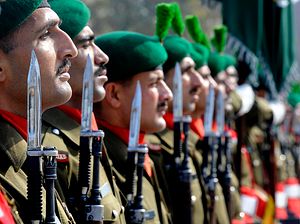Pakistan is set to increase defense spending by $578 million to $8.78 billion in fiscal year 2017-2018, Pakistan’s Finance Minister Ishaq Dar told the country’s National Assembly in late May.
This constitutes a projected 7 percent increase in overall defense expenditure. It should be noted, however, that Pakistan spends more on defense than its official estimates suggest. (Real defense expenditure could be up to 50 percent higher.)
According to Quwa Defense News & Analysis Group, the Pakistan Army will receive the lion share of funds amounting to around 47 percent or $4.17 billion, the Pakistan Air Force 20 percent or $1.8 billion, and the Pakistan Navy approximately 11 percent or 940 million respectively.
Almost 60 percent of the defense budget will be used for operating and personnel expenses. Around 20 percent or 1.87 billion will be used for military modernization and defense procurement. U.S. military aid accounts for around 10 percent of Pakistan’s official military budget.
“[W]hile the country’s economy has grown a solid 4.7 percent in 2016 and is expected to continue to expand by 5 percent in 2017 (partially due to Chinese investments under the Chinese-led China-Pakistan Economic Corridor) allowing for a modest military spending increase, the Pakistan military’s big ticket budget priorities are clearly on new combat aircraft, submarines, surface warships, and the country’s various indigenous missiles programs,” I wrote in February.
Among other things, the Pakistani government intends to add 14 additional Pakistan Aeronautical Complex/Chengdu Aerospace Corporation (PAC/CAC) JF-17 fighter jets this year and has plans for an total fleet of 150 new JF-17 aircraft divided up into three production blocks.
The Pakistan Army will also receive four Russian-made Mi-35M attack helicopters in 2017 at an estimated cost of $153 million. The United States will also deliver three Bell AH-1Z Viper twin-engine attack helicopters to Pakistan this year, as part of a $952 million weapons package.
Furthermore, Pakistan will obtain three new Saab 2000 airborne early warning & control (AEW&C) aircraft for an estimated $155 million. Deliveries for the new aircraft are expected to run from 2017 to 2020.
In addition, Pakistan will move forward with overhauling its tank force. Islamabad and Kiev have recently concluded an agreement for an upgrade of the Pakistan Army’s fleet of T-80UD main battle tanks.
“According to two signed contracts, Ukraine is slated to supply 88 tank sights and kick off a pilot project for the overhaul of an initial batch of five Pakistan Army T-80UD MBTs, which, depending on Islamabad’s satisfaction with the upgrade work on the first five tanks, will extend to the army’s entire inventory of around 300 T-80UD MBTs,” I reported in March.
Pakistan is also working on an upgraded variant of the al-Khalid MBT and plans to build as many as 600 tanks of this improved variant in the coming years.
The Pakistan Navy will continue to upgrade its three Agosta 90B-class (aka Khalid-class) diesel-electric attack submarines equipped with air-independent propulsion systems. A deal for the mid-life upgrade of the boats was signed by the Turkish state-owned defense contractor STM and the Pakistani government in June 2016.
The Pakistan Navy is also slated to start receiving the first batch of eight Chinese-made modified diesel-electric attack submarines beginning in 2023. The total cost for the acquisition of the boats is estimated at $4 to $5 billion. “Beijing is expected to extend a long term loan to Islamabad at a low interest rate,” I explained in 2016. “The first four subs are expected to be delivered by the end of 2023; the remaining four will be assembled in Karachi by 2028.”
It is unclear how much money the Pakistan military is spending on its burgeoning missile programs. Some analysts assume that Islamabad has earmarked up to $1 billion for the development of more advanced nuclear weapons this year.

































